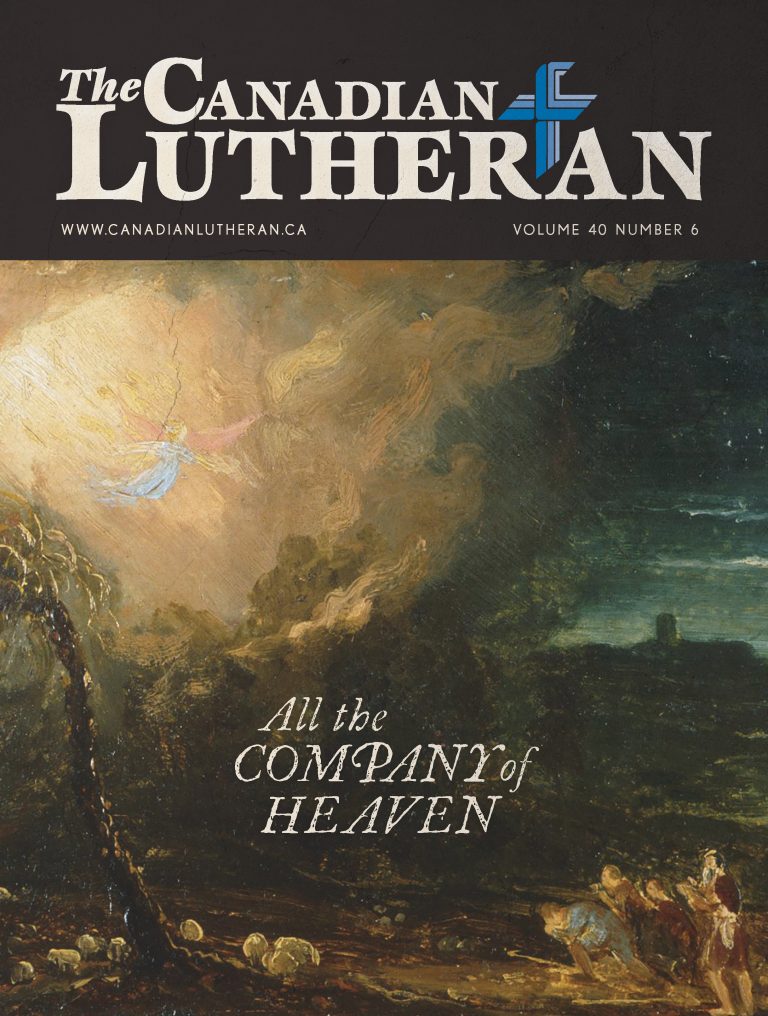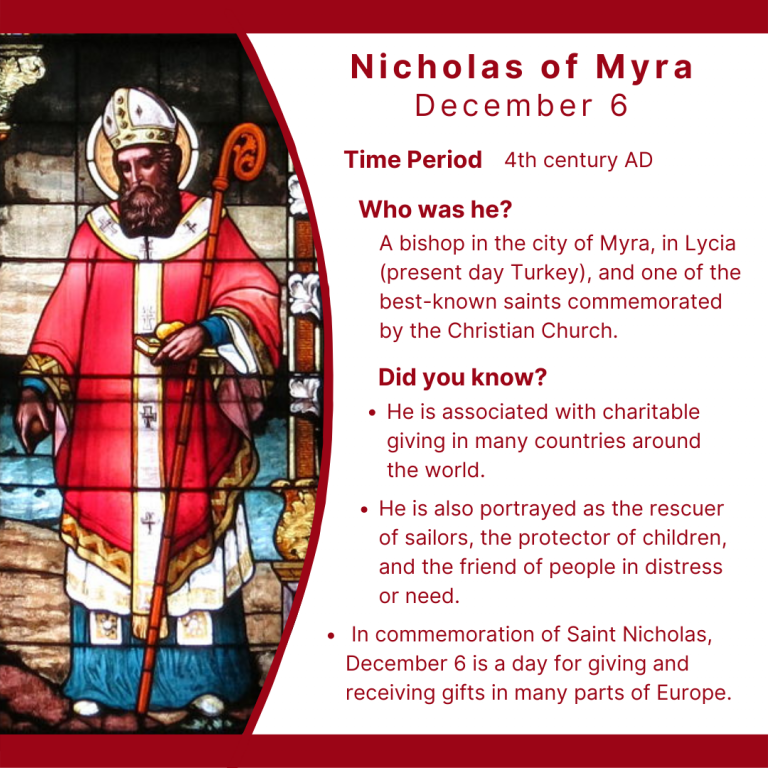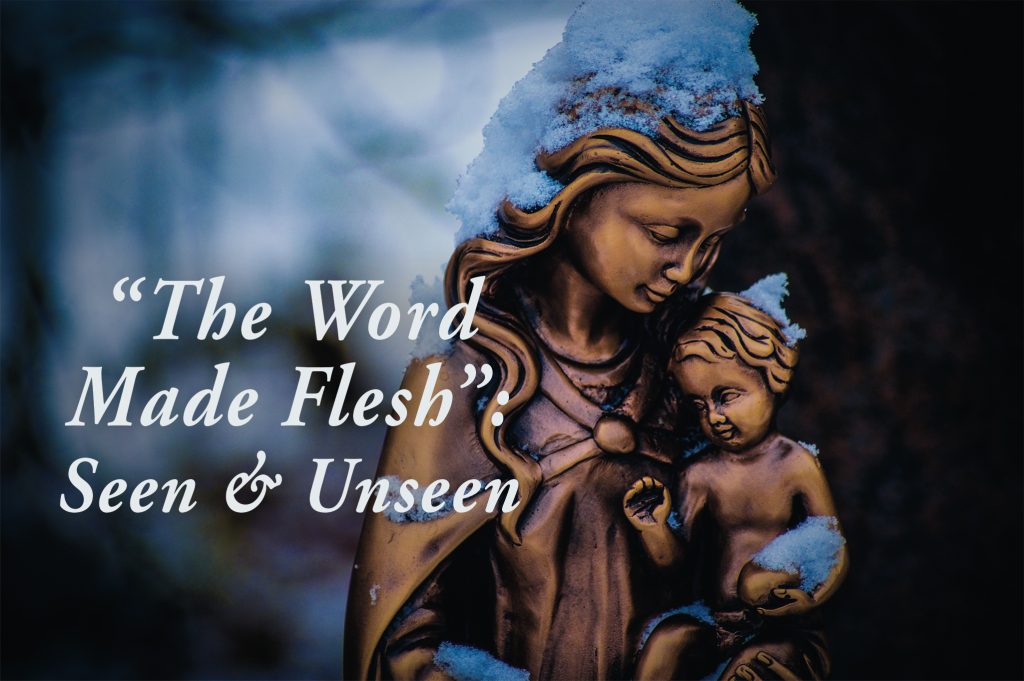“The Word Became Flesh”: Seen & Unseen
by Kelly Klages
Two Births
(for Micah, born Ascension Day 2009)
I feared the curse; I feared the labour pain
That plagues the daughters (and the sons) of earth;
But dreams would come to still my fears again
While waiting on the advent of your birth.
No messenger from heaven came to me,
Yet on one word of promise I could dwell:
Lo, I am with you always—may it be,
The God who calls Himself Immanuel.
†
Eternal Word, descending and enshrined
Within the softness of a baby’s cry;
But you, my son, will always bring to mind
The day our Lord ascended to the sky;
We were not orphaned on the day He rose
‘To heaven’s glories; now He can be near
As Mommy’s kiss upon your cheek, as close
As light, and swirling snow, and winter cheer.
†
You are my gift, and all good gifts are sent
From God the Father, glorious above;
And all these gifts a little while are lent
As I was given you to hold and love.
Now, not one birth we celebrate, but two:
The one true good and perfect Gift to men
The Father sent to come deliver you,
To see you born, and washed and born again.
†
You came to us among the blooms of spring
And filled our hearts with newly-planted joy;
Your infant eyes toward the sun, they bring
The faith and wonder of a little boy.
At Christmas, in the cold of winter’s night
The Christ awoke among the stars to see
The deepest dark, that everlasting light
And endless spring be won for you and me.
Though faithful mother-love is well, it knows
Its own temptation, and can stand at odds
With truth, and gilded cradles will oppose
The edict You shall have no other gods.
One mother, one alone, did what was good
In worshipping the baby born to her;
One child’s nativity was understood
Aright, when blessed with incense, gold, and myrrh.
†
For Who is like the Lord? Yes, who indeed,
Yet glory here with frailty is masked;
So in this incarnation we concede
That Who is our Lord like? may well be asked.
He’s like so many precious little ones
Who lay concealed among the reeds within
The river; like so many mother’s sons
That have no reservation at the inn.
I love you, baby boy, and marvel how
Our Lord is mirrored in your flashing eyes;
You bear His mark upon your heart and brow,
His infant life is in your smiles and cries.
May I reflect Him in some little way
With sacrificial love and mercy mild,
For peace on earth was given Christmas Day
When Love incarnate looked on us, and smiled.

Kelly’s husband, Rev. Alex Klages, with their son, Micah.
I wrote that poem after the birth of my oldest son on Ascension Day 2009. I was sitting in church that evening, listening to my husband preach the Word, and went into labour! Micah (whose name means “Who is like the Lord?”) was born to us shortly before midnight. Some of the major themes in the poem are Christ’s Incarnation and Ascension, and what links the two: the enduring presence of Jesus, for us, guaranteed through His Word.
One of the most astounding things that strikes a believer about the Incarnation of our Lord is that God, our God, has a human face. The closeness of our God in Christ to His people is remarkable. He not only shares our skin, but also our human suffering, sorrows, and humiliations. He came to earth as a baby, entered fully into our human existence, was seen and touched. John writes in his Gospel: “The Word became flesh and dwelt among us, and we have seen His glory…”
And yet near the conclusion of the same Gospel, the Evangelist records the words of Jesus to Thomas: “Have you believed because you have seen Me? Blessed are those who have not seen and yet have believed.” For us, Christmas is not really about seeing the face of the Christ child. It’s about acknowledging the truth and beauty of His incarnation. We give thanks for the witnesses who proclaimed the physical reality of God-with-us. “That which was from the beginning, which we have heard, which we have seen with our eyes, which we looked upon and have touched with our hands, concerning the word of life…” (1 John 1:1) But we are not the eyewitnesses. We are the doubly- blessed receivers of the incarnate Word—preached, read, received in the Lord’s Supper. We do not see, but we hear, and in this hearing is our salvation.
One of the most astounding things that strikes a believer about the Incarnation of our Lord is that God, our God, has a human face. The closeness of our God in Christ to His people is remarkable. He not only shares our skin, but also our human suffering, sorrows, and humiliations.
Peter puts it this way: “Though you have not seen Him, you love Him. Though you do not now see Him, you believe in Him and rejoice with joy that is inexpressible and filled with glory, obtaining the outcome of your faith, the salvation of your souls” (1 Peter 1:8-9).

Kelly and her son, Micah.
Many of the dark and dry periods of hardship we experience in this life have to do with things that are hidden. Perhaps things or people we love have been taken away from us in some way. Maybe we are forced into long periods of waiting and frustration. We may know the truth, but it is buried under feelings that are proclaiming the opposite to us. We long to see with our own eyes the fulfillment of our hopes and desires, while God is calling us to wait and trust Him.
My baby was born on Ascension Day. We often associate that biblical event with leave-taking and “hiddenness,” and think of the loss that the apostles and the whole world sustained. Jesus, however, ascended with words of hope and promise. His Ascension was to fill all things, to be even more intimately present to His growing Church throughout the world through the apostolic ministry of the Spirit-filled Word of God. Advent, too, is about walking by faith and not sight, knowing that God is never far from us, and He is coming soon. Having begun a good work in us, His people, will He not bring it to completion?
Christmas reminds us that long, painful, difficult Advents do come to an end in the face of the revealed Christ. God keeps His promises. His truth and the trustworthiness of His Word are the only things that matter in the end. And when we are blessed with those visible, tangible glimmers of the good that is yet to come—we give thanks.
And our eyes at last shall see Him Through His own redeeming love For that child so dear and gentle Is our Lord in heaven above
And He leads His children on To the place where He is gone. – LSB 376:4
———————
Kelly Klages is a writer and artist living in Morden, Manitoba




